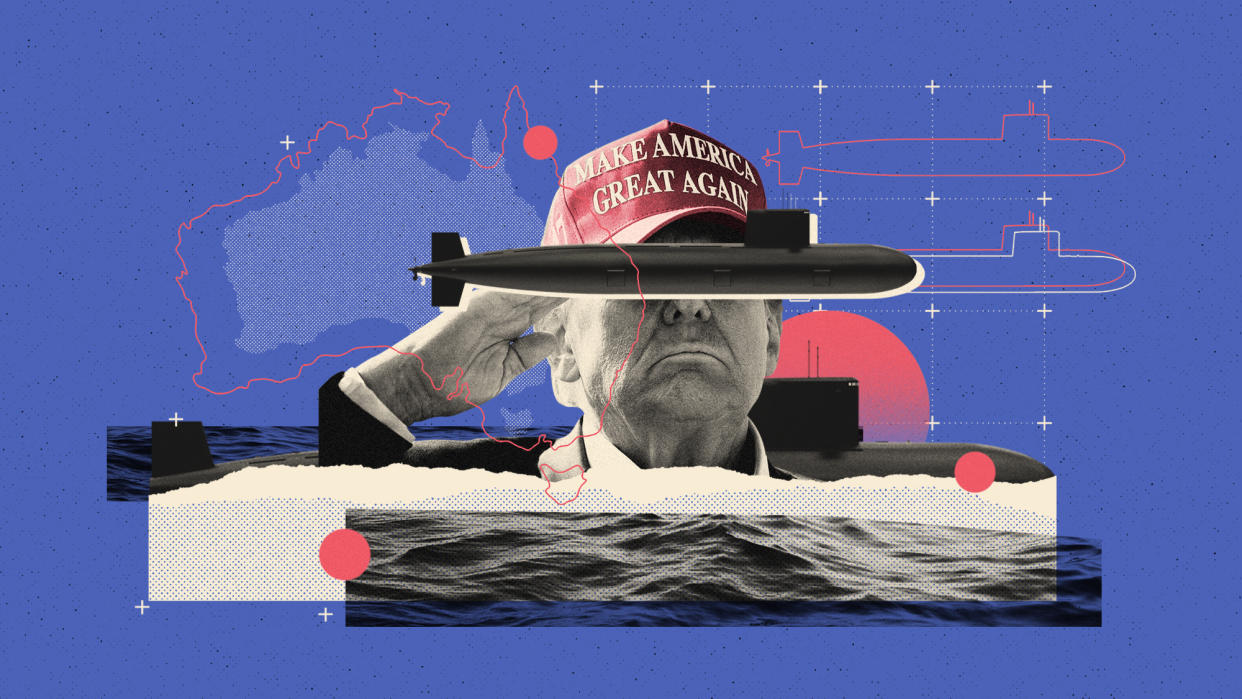Will Aukus pact survive a second Trump presidency?

- Oops!Something went wrong.Please try again later.
David Cameron has said that Aukus and Nato must get into the "best possible shape" to face Donald Trump's potential return to the White House.
Speaking after talks with his counterparts in Australia, the foreign secretary appeared to "implicitly acknowledge" the risks that a second Trump presidency might pose to the Western defence partnerships, said The Guardian.
"What we will do, as I am sure an Australian government would do, is work with whoever becomes the president," Cameron told reporters in Adelaide. "The best thing we can do is to get those alliances, to get those projects into the best possible shape, so whoever is the new president can see that they are working with a very successful set of arrangements." Cameron's comments were endorsed by the Australian deputy prime minister and defence minister.
What did the commentators say?
Trump hasn't openly expressed hostility to the Aukus deal, but his scepticism towards Nato is well known. He called nations that did not meet the 2% GDP defence spending commitment "delinquent" in a speech in February. And with the former president doubling down on his "America First rhetoric" in his campaign for re-election, many believe he "may adopt a more isolationist foreign policy position" if he wins November's election, said Politico.
The return of American isolationism "is a risk to the Indo-Pacific", an unnamed diplomat reportedly said. And "there will be a moment, if Trump wins, where Western leaders will phone each other up and ask: 'What the fuck are we going to do now?'"
The UK, US and Australia are "rushing" to sign up new partners to their Aukus partnership while the White House is "still occupied by an administration that favours the pact", said the news site.
Japan and Canada could be in line to join the so-called "pillar 2" of the Aukus agreement, which will see allied nations collaborate on military technology in areas such as artificial intelligence and hypersonic missiles.
But Aukus could be something that Trump quietly supports, said foreign affairs researcher Patrick Triglavcanin on The Interpreter. The pact is more concerned with countering the influence of China – rather than Russia – as it seeks to maintain a "rules-based order" in the Indo-Pacific.
Trump may be "unpredictable", but "one can assume he would support two of America's closest allies up-skilling their capabilities", especially when they are "aimed at the state Trump seems more concerned about", said Triglavcanin. And the pact is "certainly a demonstration" that the three nations "want to pull their weight" in the region.
Aukus is "understood to be a game-changer", said Professor John Blaxland, from the Strategic and Defence Studies Centre at the Australian National University, on The Conversation. And Democrat and Republican political leaders in Washington are aware of that.
Australia benefits from US technology "in bolstering its military and intelligence capabilities" and reducing the country's fears of being left vulnerable. At the same time, the US can keep an eye on security in East Asia using facilities there, helping to deter threats and protect its interests.
And while Trump has been critical of Nato, he has "broadly avoided" attacking Australia. "There are no indications Trump is set to change that stance, and there are some compelling reasons for the next US administration to stay the course," said Blaxland.
What next?
Following this week's talks, the UK and Australia signed a defence and security treaty and announced a £2.4 billion Australian investment in Rolls-Royce's nuclear reactor facilities, "as the two nations tighten ties in the face of rising Chinese power", said the Financial Times.
Signed by Australia's Defence Minister Richard Marles and his UK counterpart Grant Shapps, the treaty "formalises consultation over national security matters between the two countries and makes it easier to operate together on joint exercises and maritime security", said the paper.
Shapps said meetings in January in the US had strengthened his confidence in the commitment to Aukus. "Republicans really like it. Democrats really like it. I think it's one of the least controversial items in US politics," he said.
But the pact remains "fiercely debated" in Canberra, said the FT, "especially with a US election looming that could have ramifications for Washington's foreign policy".

